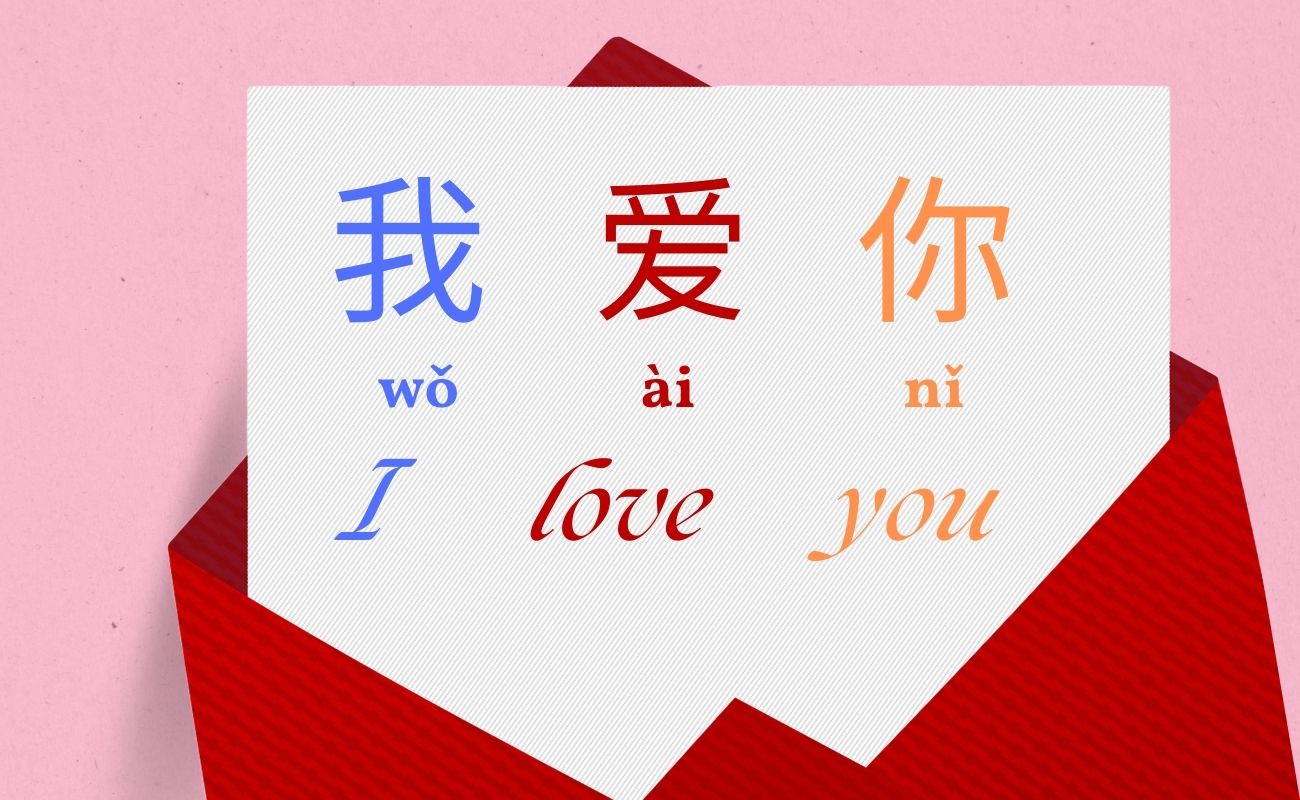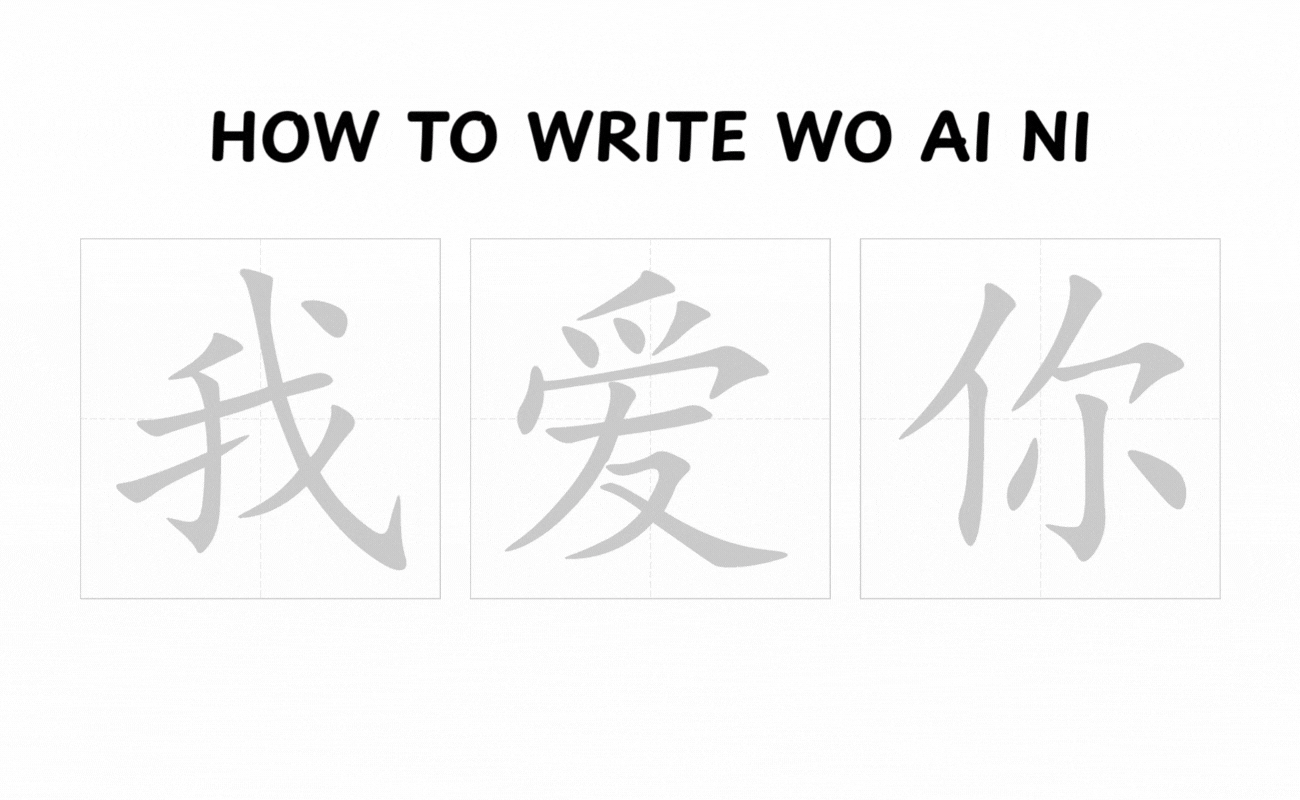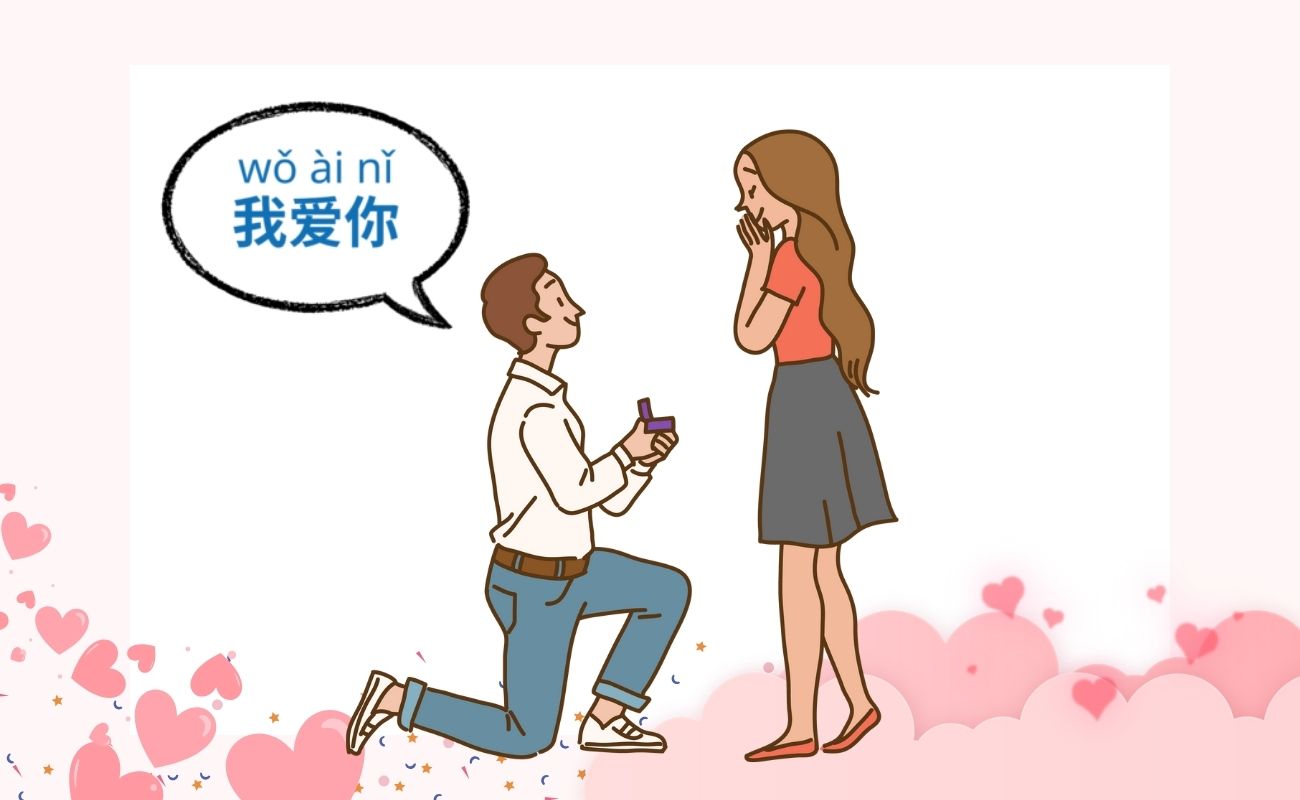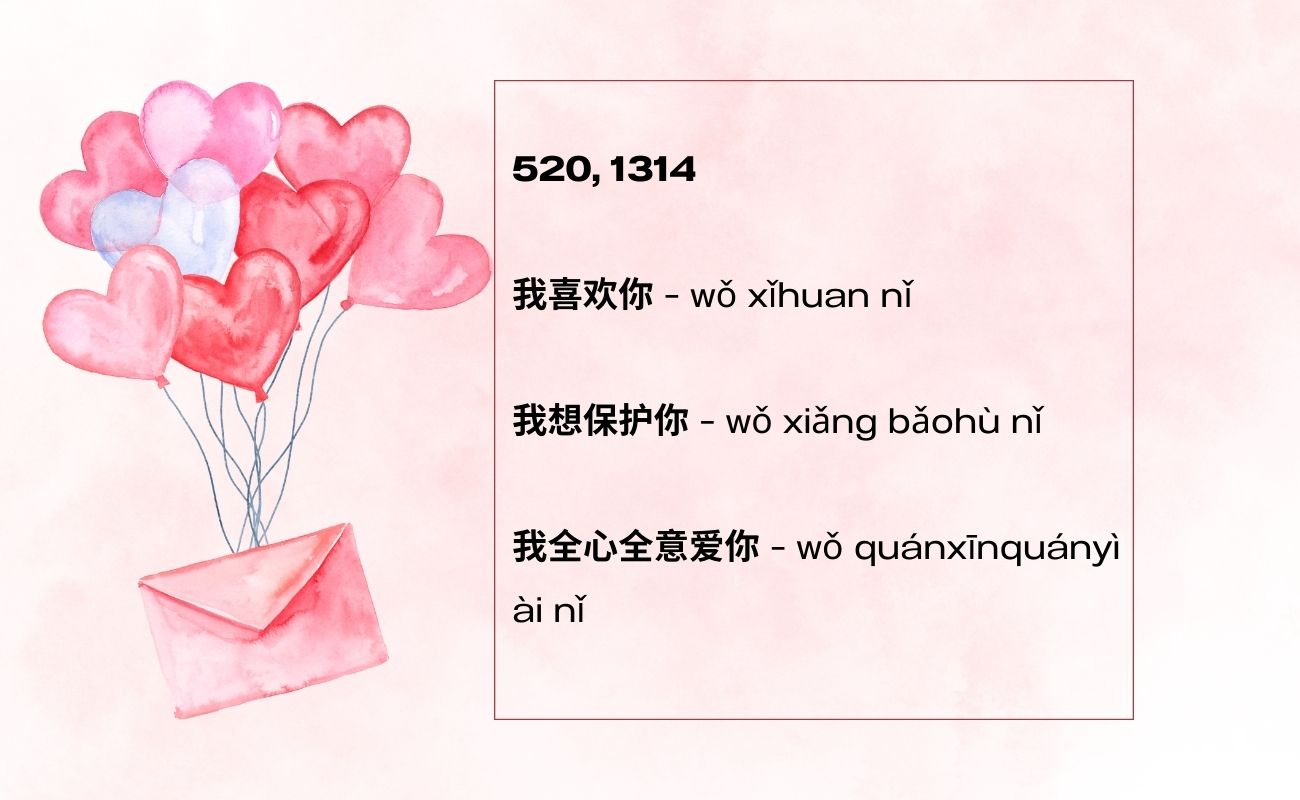What does wo ai ni mean?
At its core, wo ai ni translates directly to “I love you” in English. The phrase is built from three simple but powerful characters:
- 我 (wǒ) = “I” or “me”
- 爱 (ài) = “love”
- 你 (nǐ) = “you”
When combined, they form one of the most direct and powerful ways to express love in Mandarin.

How to pronounce and write wo ai ni
It’s easy to recognize wo ai ni on paper, but pronouncing it correctly and mastering the strokes takes your learning to a new level.
Pronunciation
To say wo ai ni correctly, it’s important to follow both pinyin spelling and tone patterns, since tones completely change the meaning in Mandarin:
- Pinyin: wǒ ài nǐ (IPA: [wɔ˨˩˦ aɪ˥˩ ni˨˩˦])
- Tone breakdown:
- wǒ (我) → 3rd tone, a dipping tone (low then rising)
- ài (爱) → 4th tone, a sharp falling tone
- nǐ (你) → 3rd tone, another dipping tone
When you say it together, the rhythm is: dip → fall → dip. Try speaking slowly at first: wǒ (pause) ài (pause) nǐ, then gradually link them into a natural flow.
See also:
Writing
The phrase wo ai ni is written in simplified Chinese as 我爱你. Each character is built stroke by stroke, following the rules of Chinese stroke order:
- Left to right: write the left components before the right.
- Top to bottom: complete the upper parts before the lower ones.
- Inside to outside: draw the inner strokes before enclosing them.
- Horizontal before vertical: write horizontal strokes first, then vertical ones.
Read more: how to memorize Chinese characters
Here’s the breakdown:
- 我 (wǒ): 7 strokes.
- 爱 (ài): 10 strokes (note: in simplified Chinese, the “heart” radical (心) is placed below rather than inside, unlike in traditional 愛)
- 你 (nǐ): 7 strokes.
Stroke order GIFs will help learners see exactly how each character is formed:

When and how Chinese people use wo ai ni
Although “wo ai ni” directly translates to “I love you,” its cultural use is far from identical to the English equivalent. In China, the phrase carries a weight that makes people choose carefully when and to whom they say it.
In romantic relationships, wo ai ni is the most direct way to confess or reaffirm love.
- Younger generations now use it more openly, whether face-to-face, over text, or even on social media.
- Older generations traditionally avoided saying it too often, seeing actions (cooking, caring, supporting) as stronger proof of love than words.

Within families, the story is even more telling. Traditionally, Chinese parents seldom used wo ai ni with their children. Yet in modern urban families, parents and children are beginning to say wo ai ni more openly, influenced by changing values and global culture.
When it comes to formal situations, wo ai ni almost never appears since it would sound too personal or intimate. Even in casual everyday speech, the phrase is reserved for the closest of relationships. Friends, colleagues, or acquaintances will typically choose lighter expressions such as wǒ xǐhuan nǐ (“I like you”) or simply a heartfelt xièxie nǐ (“thank you”).
In short, wo ai ni is not a phrase to throw around casually. It carries cultural depth, and when spoken sincerely, it can mark a special moment between two people.
Some ways to intensify the phrase wo ai ni
While wo ai ni is already powerful, Mandarin offers richer ways to show the depth or permanence of your love. These variations are built by adding adverbs or time markers:
- 我很爱你 (wǒ hěn ài nǐ) – I love you very much
The word 很 (hěn) usually means “very,” and it softens the sentence into something heartfelt but natural. The sentence flow is smoother in everyday Chinese, which is why couples use it so often.
- 我好爱你 (wǒ hǎo ài nǐ) – I really love you / I so love you
Here, 好 (hǎo) works like “so” or “really” in English. It is highly emotional and informal, often appearing in texts, songs, or spoken by younger people. Compared to hěn, this version feels sweeter and more playful, almost like a love confession said with excitement.
- 我永远爱你 (wǒ yǒngyuǎn ài nǐ) – I will love you forever
The word 永远 (yǒngyuǎn) means “forever,” and when paired with ài nǐ, it becomes a solemn promise. This phrase is common in wedding vows, love letters, or dramatic confessions.
- 我非常爱你 (wǒ fēicháng ài nǐ) – I love you deeply / extremely
The adverb 非常 (fēicháng) intensifies the feeling, much like “extremely” in English. It is more formal than hěn or hǎo, and might be used in written notes, love letters, or emotional speeches. It signals depth and seriousness rather than casual affection.
Other ways to say wo ai ni
Mandarin offers many other ways to express affection. Some are playful, some are subtle, and others carry a deeper sense of commitment.

Using numbers – Chinese “love codes”
Chinese speakers often use numbers as secret codes for affection, especially online or in text messages. This works because certain numbers sound similar to love-related words in Mandarin:
- 520 (wǔ èr líng): sounds like wǒ ài nǐ (“I love you), the most popular digital shorthand.
- 920 (jiǔ èr líng): echoes jiù ài nǐ (“just love you”), often used flirtatiously.
- 1314 (yī sān yī sì): sounds like yī shēng yī shì (“for a lifetime”), usually combined with 520 to mean “I love you forever.”
These numeric codes are part of modern Chinese internet culture, especially among younger generations. They make affection feel lighter and fun, while still carrying emotional meaning.
Using alternative phrases
Besides numbers, Chinese also offers expressions that highlight different shades of love:
- 我喜欢你 (wǒ xǐhuan nǐ) – I like you:
A gentler start, often said at the beginning of a relationship. - 我想和你在一起永远 (wǒ xiǎng hé nǐ zài yīqǐ yǒngyuǎn) – I want to be with you forever:
Stronger than wo ai ni, it conveys a promise of permanence. - 我想保护你 (wǒ xiǎng bǎohù nǐ) – I want to protect you:
A culturally rich way of showing love through responsibility rather than words. - 我全心全意爱你 (wǒ quánxīnquányì ài nǐ) – I love you with all my heart:
Formal and profound, suitable for confessions, vows, or written declarations.
Together, these expressions prove that Mandarin has more than one way to say “I love you.”
Conclusion
Wo ai ni goes beyond a direct translation of “I love you.” It reflects how Chinese people express affection through words, tones, characters, and even number codes. By learning not only its meaning but also when and how to use it, you gain a deeper understanding of both the language and the culture.
Keep exploring with Gurulango to unlock more phrases that make Chinese learning meaningful and authentic.
FAQs
- How to respond to wo ai ni?
A common reply is 我也爱你 (wǒ yě ài nǐ) – “I love you too.” In casual contexts, people may also answer with emojis, playful phrases, or gestures to show affection.
- Can I say wo ai ni to my parents?
Yes, but traditionally, Chinese families express love through actions rather than words. Saying wo ai ni to parents is becoming more common in modern, urban settings, especially among younger generations.
- What does 520 mean in Chinese?
520 (wǔ èr líng) is an internet love code that sounds like wǒ ài nǐ (“I love you”). It’s widely used in texting, online chats, and even celebrated on May 20th as an unofficial Valentine’s Day in China.
- What does lao gong wo ai ni mean?
Lǎo gōng (老公) means “husband.” So 老公我爱你 (lǎogōng wǒ ài nǐ) means “Husband, I love you,” a common affectionate phrase between married couples.
- What is the difference between wo de ai and wo ai ni?
- 我爱你 (wǒ ài nǐ) = “I love you,” a direct expression of affection.
- 我的爱 (wǒ de ài) = “my love,” which refers to love as a noun. It can describe the feeling itself or be used poetically, but it’s not typically said as a direct confession.